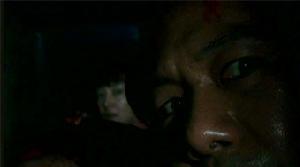
Haze (Shinya Tsukamoto, 2005)
A man (Shinya Tsukamoto) wakes up in a dark and cramped space. Unable to recall any of the events that preceded his being trapped mysteriously, he starts to make up scenarios to explain his predicament: a war broke out and he has been taken prisoner, a rich man has trapped him as a disgusting fetish. Moments later, he gets dragged (or in my sense, falls) into a spike causing him to bleed profusely; for sure he is not dreaming. After forcing and squeezing himself through the narrow passageways of the torturous maze, he meets another survivor (Kaori Fujii) lying almost lifelessly amidst the visible remains of other human beings. After a desperate chat in which both try to determine what has just happened to them, they try to find their way out of the cruel maze.
Tsukamoto's 50-minute film (I am hesitant to label the film a short film since Tsukamoto's feature films are only ten to twenty minutes longer than this) is definitely an exercise for the director to test his mettle in visceral horror. He begins in absolute claustrophobia. His camera is focused on the sweaty and nervous face of the trapped man. The only sounds audible are those caused by him (tapping; heavy breathing; moans) or mysterious clanging noises from the unknown beyond. Voice overs dictate his psychological standing; a mixture of confusion, desperation, and hopelessness. Truly, the first twenty minutes of Haze is absolutely grating and is an absolute test of your limitations in film viewing. There's not much to see as the film (shot in digital video) is draped in darkness, but what's there to see is an absolute threat to your visual senses. The visual claustrophobia is enunciated by sound effects that further the cinematic torture (most probably enjoyed by those who savored films like Saw (James Wan, 2004) and Hostel (Eli Roth, 2005)).
It seems senseless at first and believe it or not, Haze does work best when it loses you in absolute confusion and induced paranoia. Tsukamoto's cinema is mostly visceral. Despite his being labeled as Japan's Cronenberg, his films doesn't quite reach an extent that surpasses his wild imagery. His later films (A Snake of June (2002), and Vital (2004)) try to encompass his visual energy with depth and narrative sensibility to a certain degree. Haze doesn't quite work when it tries to overcome its visceral side by trying to provide an explanation to the maddening insanity that is depicted. It seems that Tsukamoto is aiming for a metaphor but merely succeeds in compounding the film with conventionality it doesn't need.
Haze, at least after the first twenty minutes that was purely horror, with none of the fatty excesses of gratuitous narrative, goes downhill to art film pretentiousness. It's too bad because I thought Haze could've shown a thing or two how visceral horror films should be done, but instead of treading the road less traveled, makes a U-turn to needless explanation and narrative revelations. It's still worth watching, I suppose. It is after all merely fifty minutes long, and while it lasted, is a heart-pounding, eye-straining, and mind boggling labyrinthine "masturbatory" feat by Japanese auteur Shinya Tsukamoto.







wm.jpg)

























.jpeg)





No comments:
Post a Comment